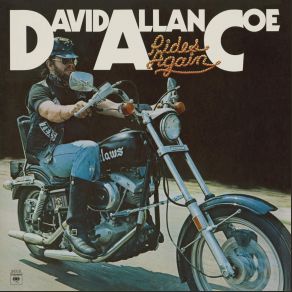Rides Again
Download links and information about Rides Again by David Allan Coe. This album was released in 1977 and it belongs to Rock, Country, Outlaw Country, Songwriter/Lyricist genres. It contains 11 tracks with total duration of 31:18 minutes.

|
|
|---|---|
| Artist: | David Allan Coe |
| Release date: | 1977 |
| Genre: | Rock, Country, Outlaw Country, Songwriter/Lyricist |
| Tracks: | 11 |
| Duration: | 31:18 |
| Buy it NOW at: | |
| Buy on iTunes $9.99 | |
| Buy on Amazon $9.99 | |
Tracks
[Edit]| No. | Title | Length |
|---|---|---|
| 1. | Willie, Waylon and Me | 3:14 |
| 2. | The House We've Been Calling a Home | 2:53 |
| 3. | Young Dallas Cowboy | 2:28 |
| 4. | A Sense of Humor | 1:40 |
| 5. | The Punkin Center Barn Dance | 2:28 |
| 6. | Willie, Waylon and Me (Reprise) | 1:09 |
| 7. | Lately I've Been Thinking Too Much Lately | 3:20 |
| 8. | Laid Back and Wasted | 2:32 |
| 9. | Under Rachel's Wings | 3:08 |
| 10. | Greener Than the Grass We Laid On | 3:36 |
| 11. | If That Ain't Country | 4:50 |
Details
[Edit]Even though Rides Again marks the first time David Allan Coe was allowed to use his own band on half of the album — a major concession on the part of Columbia Records because he hit pay dirt a couple of times — this stands as his most disappointingly inconsistent record of the 1970s. The last track on his previous album, "Dakota the Dancing Bear, Part II," was an exercise in cynical, pointless counterculture idiocy and, unfortunately, was the first of Coe's "novelty" songs. On Rides Again, by trying to make a conscious outlaw record and aligning himself with the movement's two progenitors on the opening track, "Willie, Waylon, and Me" (and equating himself with not only the Flying Burrito Brothers and the Eagles, but the Beatles as well!), Coe already set up self-parody unintentionally — something that continued to curse him. There are fine moments as well, such as "Under Rachel's Wings," "The House That We Call Home" (though it is the first of Coe's songs about polygamy), the plaintively moving "A Sense of Humor," the passionate and poetic "Greener Than the Grass We Laid On," and a killer cover of Dale Murphy's "Laid Back and Wasted." And while not without merit, the opening track — with its reprise halfway through the album — "Young Dallas Cowboy," and the infamous "If That Ain't Country (You Can kiss My Ass)" mar what might have been an exceptional album if Coe could only have contained his anger at the musical establishment in Nash Vegas, and not begun caricaturing himself — which added credibility to critics. This is not the place to start with Coe, but fans will most certainly want at least half of the tracks on this album.